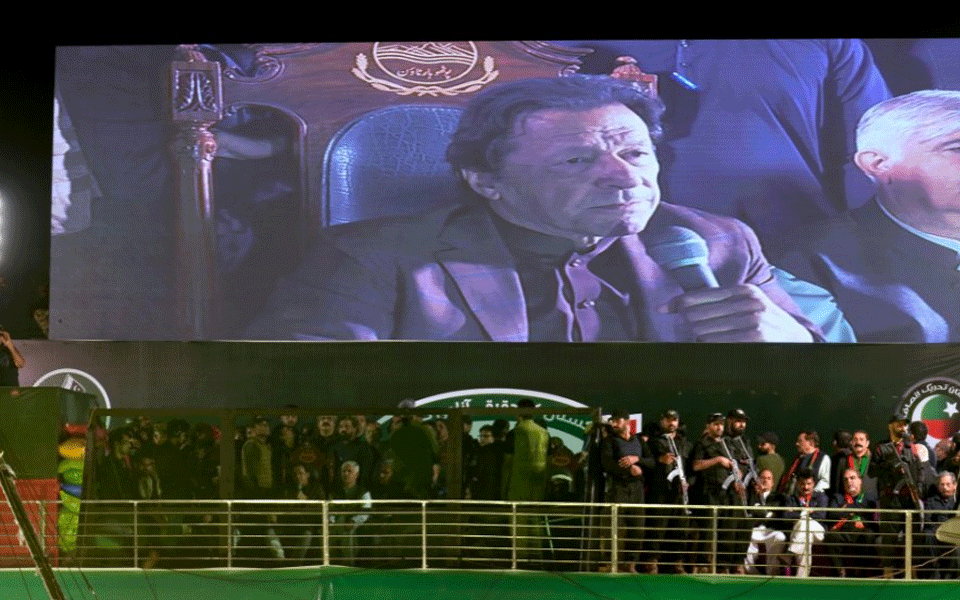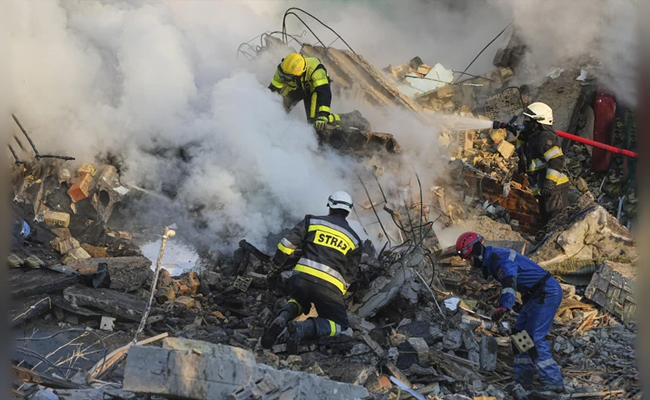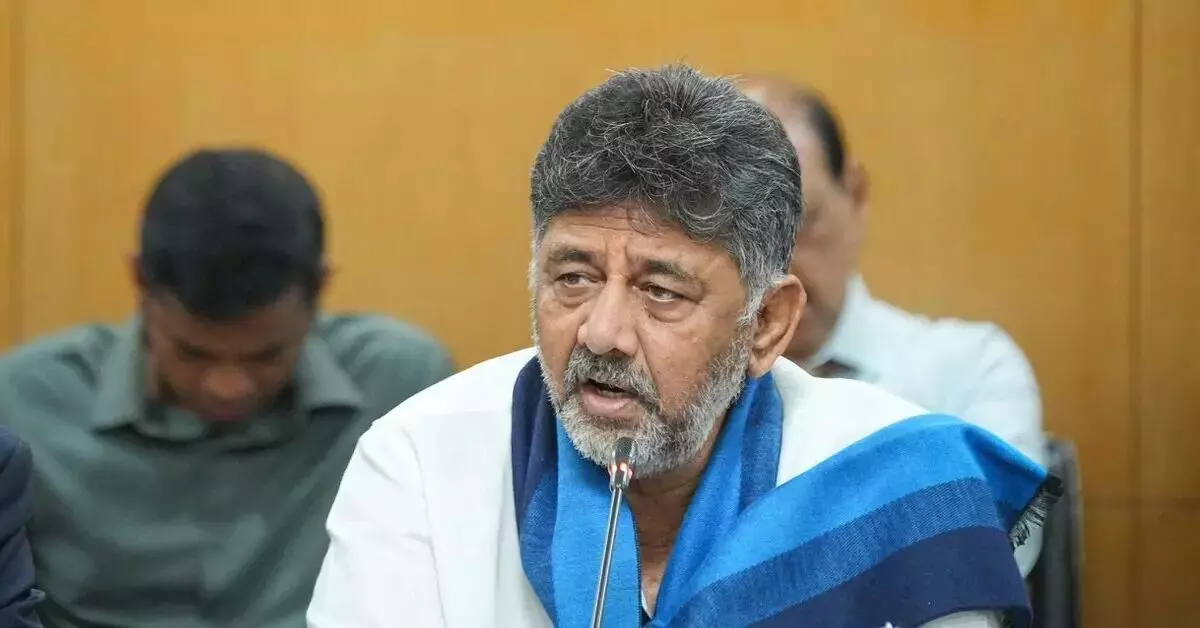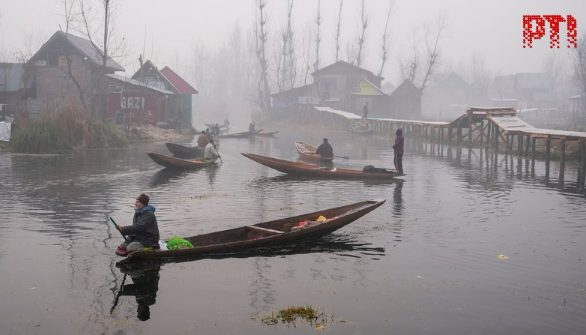Rawalpindi (PTI): vAddressing a massive rally of his Pakistan Tehreek-e-Insaf party here in this garrison city, which houses the headquarters of the powerful Army, Khan also alleged that "three criminals", who were behind the failed assassination attempt on him early this month, are waiting to target him again.
The 70-year-old leader, who appeared with plaster on his right leg, has repeatedly alleged that Prime Minister Sharif, Interior Minister Rana Sanaullah and ISI Counter Intelligence Wing head Maj-Gen Faisal Naseer were behind the attack on him.
"We will not be part of this system. We have decided to quit all the assemblies and get out of this corrupt system," Khan said in his first in-person address to the party workers after the failed assassination bid on his life.
"I will consult all chief ministers and party leaders to leave the assemblies," he said, adding that his party had decided not to go to Islamabad to avert any destruction or chaos.
Khan's party has governments in Punjab and Khyber-Pakhtunkhwa as well as in Pakistan-occupied Kashmir and Gilgit-Baltistan. It has representation in the Sindh and Balochistan assemblies also.
The party lawmakers had already resigned from the National Assembly but the resignations of all lawmakers were not accepted.
Khan also announced to continue his protest until new elections were announced. Elections are not due in Pakistan until the term of the current National Assembly gets over in August 2023.
"The movement of Haqeeqi Azadi will continue until genuine freedom is achieved," he said, adding that the moment would come once new elections were held.
He said that today's rally was held because "we want elections" to take the country forward. "I am here to tell them that there is no other way except elections."
Khan also said that the country was heading towards a default which would compromise its national security. He said that default risk was more than 100 per cent which was just 5 per cent when his government was toppled in April.
During his nearly 80-minute address, he also talked about the sleaze in the country and accused the powerful establishment (Army) of tolerating corruption.
Khan said his government was successful but its only failure was that it could not bring the National Accountability Bureau (NAB), the anti-corruption body, under his control to punish the corrupt people.
"It (NAB) was controlled by the establishment. Instead of bringing the corrupt element to the law, the establishment was cutting a deal with them," he said.
He went on to add: "Those having power don't mind corruption That is why they have installed the corrupt elements."
He also talked about the removal of his government through conspiracy and failure of the establishment to stand against it. "If they (establishment) did not commit the conspiracy, they failed to stop it," he said.
Khan also said that the establishment could have stopped the return to power of what he called corrupt elements but it failed to do so.
He once again reiterated that a foreign conspiracy was hatched to topple his government and it had been proven by the secret cypher which was placed before the National Security Council meeting which was attended by the top military leadership.
Talking about the attack on his convoy in Wazirabad on November 3, he said that there were three attackers, including the one who was arrested and another two.
He said that the second attacker fired at him but missed the target when he fell down and the bullet flew over his head, while the third attacker was tasked to eliminate the first gunman and he fired but instead hit an innocent participant who was killed.
He also defended his performance during his rule by claiming that he had turned around the economy despite the Covid-19 pandemic. He said 5.7 per cent growth was recorded in 2021 and it was 6 per cent in 2022, which was the highest in 17 years.
Khan said that during the seven months of the current government, the price hike has been the highest in the last 50 years of the country, while all other indicators have also dropped down.
The former premier alleged that by removing his government, the establishment not only destroyed the economy but also served a blow to democracy, constitutionalism and morality of the country.
Khan called on his supporters to free themselves from the fear of death if they wanted to live freely.
"Fear makes an entire nation into slaves," he said, referring to the battle of Karbala in present day Iraq where the Prophet's grandson Imam Hussain was killed along with his family members for raising his voice against the tyrant ruler of his time.
Khan, who was accompanied by a team of doctors as he arrived in a helicopter in the garrison city of Rawalpindi on Saturday, said everyone had advised him when he was setting out from Lahore not to do so due to his injured leg as well as the threats to his life.
He said he went ahead because he had seen death from close range.
"If you want to live life, shun the fear of death," he said.
Khan said the nation stands at a "defining point" and "crossroads" with two paths before it - one path was one of blessings and greatness while the other path was of humiliation and destruction.
He asked the people to differentiate between right and wrong.
Earlier, Khan travelled from Lahore by a special plane to Nur Khan air base of Pakistan Air Force in Rawalpindi. He was later moved by helicopter to the Arid Agriculture University adjacent to the venue of his address in Rawalpindi.
The Rawalpindi administration had issued a notification that read that the England cricket team would soon arrive in Rawalpindi, therefore the venue should be completely vacated after the rally was over.
PTI secretary general Asad Umar said that Khan was facing a threat and the government would be responsible if something happened to him.
Strict security measures were taken by the government and police made elaborate arrangements to provide security to the participants and Khan, Deputy Inspector Police for Operation, Sohail Chatha, told the media.
He said that more than 17,000 police personnel were deployed to keep security during the rally.
Sources said that Rawalpindi police had deployed over 300 snipers on rooftops to foil any attempt on Khan's life.
Rawalpindi has a history of attacks on politicians and so far two prime ministers have been killed in the garrison city, including the first prime minister Liaquat Ali Khan in 1951 and two-time premier Benazir Bhutto in 2007.
The former cricketer-turned-politician was ousted from power in April after losing a no-confidence vote in his leadership, which he alleged was part of a US-led conspiracy targeting him because of his independent foreign policy decisions on Russia, China, and Afghanistan. The US has denied the allegations.
Let the Truth be known. If you read VB and like VB, please be a VB Supporter and Help us deliver the Truth to one and all.
Kyiv (AP): Eight people were killed and 27 wounded in a Russian missile strike on port infrastructure in Odesa, southern Ukraine, late on Friday, Ukraine's Emergency Service said on Saturday morning.
Some of the wounded were on a bus at the epicentre of the overnight strike, the service said in a Telegram post. Trucks caught fire in the parking lot, and cars were also damaged.
The port was struck with ballistic missiles, said Oleh Kiper, the head of the Odesa region.
ALSO READ: 'Have not received complaint yet': Delhi Police on assault by off-duty Air India Express pilot
Elsewhere, Ukrainian forces hit a Russian warship and other facilities with drones, Ukraine's General Staff said in a statement on Saturday.
The nighttime attack on Friday hit the Russian warship “Okhotnik,” according to the statement posted to the Telegram messaging app.
The ship was patrolling in the Caspian Sea near an oil and gas production platform. The extent of the damage is still being clarified, the statement added.
A drilling platform at the Filanovsky oil and gas field in the Caspian Sea was also hit. The facility is operated by Russian oil giant Lukoil. Ukrainian drones also struck a radar system in the Krasnosilske area of Crimea, which Russia illegally annexed from Ukraine in 2014.





